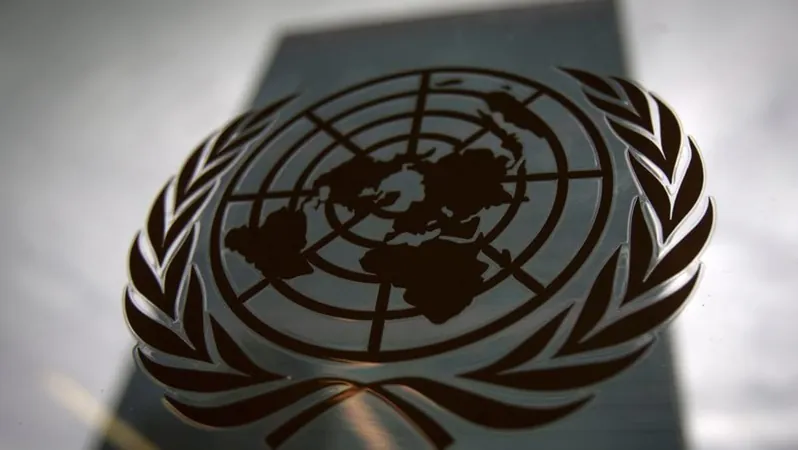
The Global Order is Looming Under Threat: Insights from Singapore's Foreign Affairs Minister
2025-03-03
Author: Rajesh
SINGAPORE:
The once steadfast rules-based international order, established over the last 80 years, now teeters on the brink of collapse, according to Vivian Balakrishnan, Singapore's Foreign Affairs Minister. On March 3, he warned that without concerted action, the world may soon witness a retreat into a “law of the jungle,” where the mantra “might makes right” dominates global interactions.
Minister Balakrishnan highlighted a significant transition occurring in global dynamics: a shift from unipolar power structures to a more complex multipolar world. This evolution is entwined with a rise in protectionism, increased unilateral actions, hyper-nationalism, and growing xenophobia, indicating a prevalent atmosphere of anxiety rather than optimism.
The Minister pointed out that as key nations adopt a more transactional and sometimes coercive stance, this approach exacerbates existing global tensions, fueling fierce rivalries and undermining trust. Major nations are increasingly prioritizing their narrow national interests, often at the expense of cooperative global governance.
Economic Ramifications
In economic terms, Balakrishnan delineated how recent U.S. policies and similar actions from other nations are implementing tariffs and other restrictive measures that extend far beyond traditional trade disputes. He warned that such actions could escalate into a larger trade war, affecting the global market's complexion. While Singapore hasn't been directly targeted by such tariffs, the nation’s critical role as a transshipment hub could also lead to significant disruptions in trade patterns.
Impact of Technology on Trade
The foreign minister elaborated on the challenges faced in the high-tech sector, where competition among global powers has intensified. He indicated that new regulations surrounding advanced technologies—especially in areas like semiconductors and critical minerals—threaten Singapore's long-standing position as an open and welcoming hub for international business. With increasing scrutiny from all sides, the delicate balance between engaging with diverse partners and maintaining national interests is becoming harder than ever to navigate.
Geopolitical Tensions
Adding to the precariousness of the global landscape, Balakrishnan stressed that ongoing geopolitical tensions, particularly stemming from the Russia-Ukraine conflict, pose dire implications for global stability. He cited the strained transatlantic relationship following public disagreements between leaders, marking a significant shift in longstanding U.S. foreign policy.
The third critical area mentioned by the Minister is the diminishing ability to collectively tackle global challenges like climate change and pandemics. Institutions such as the World Health Organization and treaties like the Paris Agreement are losing traction, creating a dire scenario for effective cooperation when crises occur.
Singapore's Adaptive Strategy
In light of these tumultuous shifts, Singapore’s foreign policy will need to balance realism and idealism, stated Balakrishnan. For six decades, Singapore has championed a position of agency, emphasizing its sovereignty and relevance on the global stage without succumbing to a fatalistic viewpoint.
Moreover, Singapore’s independence from reliance on external assistance equips it to resist pressures from larger powers. As Balakrishnan noted, “We cannot be bullied or bought. Our strength lies in our ability to defend ourselves without needing to make concessions to external entities.”
Looking forward, the Minister asserted that Singapore's foreign relations will continue to be founded on long-established principles while adapting tactics to changing global circumstances. Engaging constructively with both the United States and China remains vital, along with strengthening connections within ASEAN and expanding partnerships globally—including with countries in India, Japan, and across Africa and Latin America.
The Path Ahead
Despite the ominous signs of a fracturing global order, Balakrishnan expressed a sense of optimism about Singapore’s future rooted in the efforts of past generations. With core strengths in economic resilience, self-defense capabilities, and societal cohesion, Singapore aims to navigate through these turbulent waters while advocating for an open world that champions trade as a means to peace and prosperity.
As Balakrishnan concluded, "Even amid setbacks for free trade, we can forge alliances with those who share our vision for a cooperative global economy—a vision that holds the key to sustaining mutual peace and prosperity."







 Brasil (PT)
Brasil (PT)
 Canada (EN)
Canada (EN)
 Chile (ES)
Chile (ES)
 Česko (CS)
Česko (CS)
 대한민국 (KO)
대한민국 (KO)
 España (ES)
España (ES)
 France (FR)
France (FR)
 Hong Kong (EN)
Hong Kong (EN)
 Italia (IT)
Italia (IT)
 日本 (JA)
日本 (JA)
 Magyarország (HU)
Magyarország (HU)
 Norge (NO)
Norge (NO)
 Polska (PL)
Polska (PL)
 Schweiz (DE)
Schweiz (DE)
 Singapore (EN)
Singapore (EN)
 Sverige (SV)
Sverige (SV)
 Suomi (FI)
Suomi (FI)
 Türkiye (TR)
Türkiye (TR)
 الإمارات العربية المتحدة (AR)
الإمارات العربية المتحدة (AR)